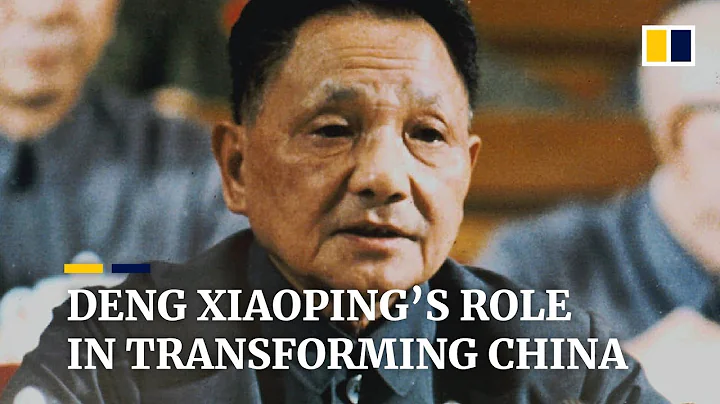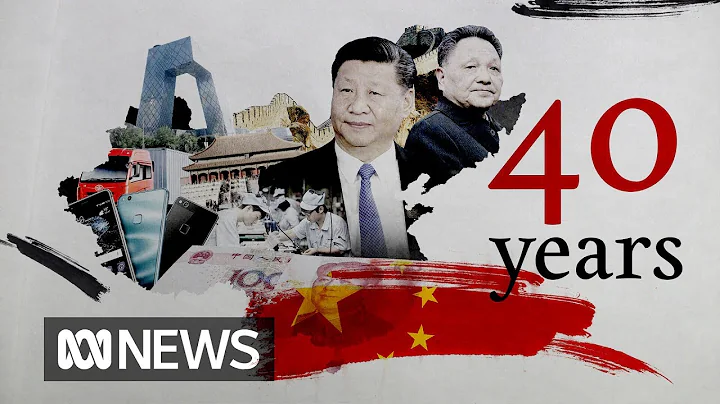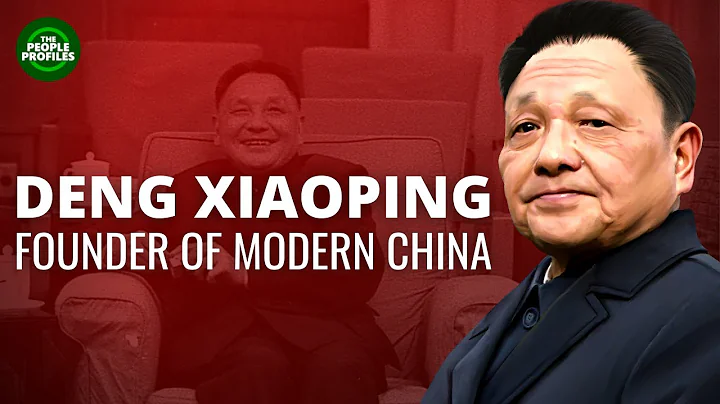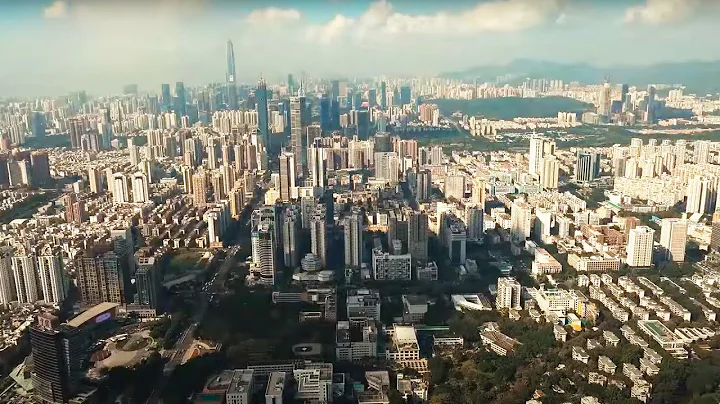Beginning in 1978, Deng Xiaoping, as the chief architect of reform and opening up, began to lead the Chinese people in their efforts to achieve prosperity and strength.
Because many policies of reform and opening up are very different from those since the founding of the People's Republic of China, it has aroused a lot of speculation in Western countries.
Therefore, in an exclusive interview with American journalist Wallace in 1986, Deng Xiaoping not only answered many policy questions about China that concerned the American public, but also effectively countered speculation that China would change its social system.
It can be said that Deng Xiaoping’s wonderful response in that interview is still a valuable asset for us in building socialism with Chinese characteristics .

Deng Xiaoping
In order to use Wallace to change the impression of the Western public, Deng Xiaoping accepted an exclusive interview with him
Due to the fact that the Western camp led by the United States has long supported the reactionary Kuomintang government represented by Chiang Kai-shek, Western society has always had doubts about the leadership of the Communist Party of China. Groundless conjecture that people are very serious.
On the eve of the founding of New China, only a few famous journalists such as Snow and Smollett had cordial interviews with the leaders of the Communist Party of China in Yan'an and other places. Later, due to the prevalence of McCarthyism in the United States, many precious news interview contents were strictly banned by the US government.
After Deng Xiaoping made the great plan of reform and opening up to the West in 1978, many Western reporters came to China to explore new news materials.
Among the Western media people who came to China to "hunt for treasure", there is a famous Western reporter named Mike Wallace .
Wallace is the founder of the "60 Minutes" program of the famous CBS in the United States, and began to serve as the host and main reporter of the column in 1968.

Wallace
According to the evaluation of many celebrities interviewed by Wallace, he is very good at asking questions from a unique perspective, which sometimes makes them unable to get off the stage.
For example, before being interviewed by US President Johnson, he warned him: "I don't want to talk about Vietnam . If you dare to mention Vietnam, I will tell you guys to get out immediately."
Wallace replied humorously. : " The Vietnam War raped you, Mr. President, and then you raped all of America. You should talk about it!"
Because of Wallace's frequent interviews with important news topics, "60 Minutes" became the most popular show in the United States. The ratings of and are quite high. Therefore, after Wallace arrived in China in 1986, he suddenly came up with the idea of interviewing Deng Xiaoping, China's top leader at the time.
Faced with Wallace's enthusiasm, the relevant departments did not know how to respond, so they had to report it to Deng Xiaoping. At this time, Deng Xiaoping also hoped to find an effective way to directly convey his ideas to the general public in the United States.

Wallace
Although Deng Xiaoping devoted himself to the revolution when he was young, he had the experience of studying in France for three years, and also led delegations to visit abroad many times.
Therefore, Deng Xiaoping was very aware of the power of news media in the West, and he naturally had to make full use of the opportunity to communicate face-to-face with famous Western media people.
Since the influence of "60 Minutes" in the United States is extraordinary, in Deng Xiaoping's words, he wanted to use this person and this opportunity to meet with Americans so that the American people can better understand themselves and China.
So the relevant departments informed Wallace that Deng Xiaoping agreed to be interviewed. Wallace was happy and suggested that it would be better not to arrange it in the Great Hall of the People, but in Zhongnanhai, which has a Chinese classical architectural style.

Deng Xiaoping
continued to raise questions about China's surroundings, and Deng Xiaoping's impeccable answers impressed him
On the morning of September 2, 1986, in Zhongnanhai, Wallace and his staff finally met the Deng Xiaoping they had been looking forward to [1].
Deng Xiaoping specially wore a set of exquisite black Zhongshan suit that day, and a pair of shiny black leather shoes on his feet, which were neat, simple and steady. When he saw Wallace, he walked up quickly and offered to shake his hand, which made Wallace feel very honored for a moment.
Wallace couldn't hide his excitement and said: "I regard today's conversation with you as a very rare opportunity. Because of people like you, it is not easy for us reporters to get exclusive interview opportunities."
Facing Gao Deng Xiaoping said modestly and sincerely: "I am just an ordinary person."
After the two sat down, Deng Xiaoping took out a box of Panda brand cigarettes from his arms and lit one himself. Wallace offered to ask if he could Give him one. In this way, the two of them smoked a pack of cigarettes and started the day's interview.

Wallace
Although China's international environment in the 1980s was somewhat gentler than before, there were constant hot issues surrounding it. Wallace is very good at warming up before formal interviews, so he first mentioned Sino-Soviet relations.
Wallace said: The new leader of the Soviet Union, Mikhail Gorbachev, gave a speech in Vladivostok, hoping to improve Sino-Soviet relations. What do you think?
Deng Xiaoping replied that he had noticed Gorbachev's latest speech, but thought that the steps he had taken were still too small.
Deng Xiaoping also said that he had proposed a few years ago that there were three major obstacles to the improvement of Sino-Soviet relations.
First of all, the Soviet Union should withdraw its huge army, including in Mongolia, which always threatens China's border security.
Secondly, the Soviet Union should take the initiative to withdraw the troops that invaded Afghanistan .
Third and most important, the Soviet Union should prompt Vietnam to withdraw its troops from Cambodia , which was the biggest obstacle in Sino-Soviet relations.
If the Soviet leader could do this, then he would be willing to go to the Soviet Union in person to talk to Gorbachev regardless of his 82-year-old age.

Gorbachev
Wallace saw that Deng Xiaoping seemed dissatisfied with Gorbachev's remarks, so the conversation changed to Sino-US relations.
Wallace said that Reagan and his family paid great attention to "60 Minutes" and asked Deng Xiaoping if he believed that the current relationship between China and capitalist countries like the United States was better than that with socialist countries like the Soviet Union.
Deng Xiaoping naturally saw the trap and replied:
" President Reagan We have known each other since President Reagan and his wife visited China, and the conversation between us was harmonious and candid. I would like to use your TV station to convey my gratitude to Reagan Best wishes from the President and his wife. I also hope that Sino-US relations can further develop during President Reagan’s administration.”
But Deng Xiaoping then told Wallace that China and the Soviet Union currently have conflicts of interest, and Sino-US relations have common interests, but This has nothing to do with ideology , and it does not mean that the social systems of China and the United States are close to the same. Deng Xiaoping actually shattered the unfounded speculation of some Americans that China was going to take the road of capitalism .

Deng Xiaoping
Deng Xiaoping also pointed out that there are three major obstacles in Sino-Soviet relations, and the biggest obstacle in Sino-US relations is the Taiwan issue.
There is a saying in the United States that the United States is "non-involved" in the Taiwan issue. But history has eloquently proved that since the MacArthur and Dulles eras, the United States has presented Taiwan as an unsinkable aircraft carrier in the Western Pacific.
Moreover, while the US government recognized the "One China" principle, it also passed the so-called "Taiwan Relations Act" during the Carter administration, blatantly interfering in the issue of China's reunification.
Deng Xiaoping's judgment seemed to arouse Wallace's dissatisfaction. Based on Western political concepts, he actually asked Deng Xiaoping: Why must China be unified with Taiwan?
Deng Xiaoping naturally saw the key point, and he replied: China has at least three reasons for wanting to unify with Taiwan.

Deng Xiaoping
Firstly, from the perspective of national sentiment, both sides of the Taiwan Strait are descendants of the Yanhuang people. Since we are all one family, we should be unified.
Secondly, according to international law , Taiwan is part of China. If the de facto state of separation is maintained, Taiwan may be taken away by foreign forces, and it is completely untrue that Taiwan belongs to China.
Thirdly, if Taiwan is unified with China, then the " one country, two systems " system will also be implemented. Therefore, reunification will not have any negative impact on Taiwan compatriots.
Wallace still refused to give up and asked Deng Xiaoping a sharp question: The income gap between Taiwan and mainland China is so big, why are Taiwanese people willing to reunify?
Deng Xiaoping replied:
Taiwan’s high income has its own special historical and practical reasons. Now the mainland has begun to focus on economic construction, and its annual economic growth rate is higher than that of Taiwan. Moreover, Taiwan is short of resources, while mainland China is rich in resources. After a period of development, the economic levels of both sides of the Taiwan Strait will be close, so the income gap is not a reason to obstruct China's reunification.

Deng Xiaoping
's different interpretations of Mao and Deng's policies comprehensively elaborated on the need for socialism to achieve "common prosperity"
Seeing that he hit a wall on the Taiwan issue, Wallace had to turn from politics to economics.
He asked Deng Xiaoping again: Now you are carrying out reform and opening up and vigorously attracting foreign investment, but many foreign investors report that China now has many problems, such as high rents, expensive labor, and poor government service attitudes.
Deng Xiaoping replied: Our recent economic construction naturally has many shortcomings and deficiencies, but through continuous reforms, China can achieve rapid economic development.
When it comes to economic development, Wallace seems to have finally found a breakthrough.
He said that when he was interviewing in Guangdong, he saw with his own eyes the Chinese people's efforts to pursue wealth, but he also believed that this conflicted with the CCP's long-term propaganda.

Deng Xiaoping
So he asked Deng Xiaoping: You have now put forward the slogan of getting rich is glorious, which has also aroused heated discussion in Western countries. Does this have anything to do with communism?
Obviously, Wallace was still trying to set a trap for Deng Xiaoping, thus proving that China would turn to developing capitalism.
Deng Xiaoping first made it clear: "Socialism is the primary stage of Chinese communism. The main task of this period is to make people's lives better day by day, increase social material wealth, and create conditions for entering communism."
He further explained: We are indeed pursuing prosperity, but we are asking for common prosperity. Compared with capitalism, what China wants is "common prosperity" rather than a serious gap between rich and poor.
To build socialism in China, we must first develop production and secondly, achieve common prosperity [2]; this is fundamentally different from Western capitalism that exploits working people.

China at the end of the last century
Wallace seemed to want Deng Xiaoping to admit that the CCP had changed its course, so he raised this question: You once said that you would meet Marx a hundred years later. If Mao Zedong was also next to Marx, do you think Mao Zedong would agree with the current policy?
In fact, as early as 1980, when the famous Italian journalist Farage interviewed Deng Xiaoping, he bluntly asked him whether would be China's Khrushchev , thereby asking whether Deng Xiaoping wanted to deny all of Chairman Mao's policies [3] .
Deng Xiaoping said that Chairman Mao was the great leader of the Chinese people. He led China towards liberation and also hoped that China could achieve prosperity. Although the policies of Chairman Mao's period are somewhat different from those of today, they are still essentially the same.
Moreover, the CCP passed the "Resolution on Historical Issues" and still regards Mao Zedong Thought as the most important guiding ideology of the Chinese Communist Party. Therefore, although some policies are different between now and Chairman Mao's era, the central idea is the same.

Chairman Mao
Wallace was a little surprised that Deng Xiaoping praised Chairman Mao. He also asked Deng Xiaoping how he viewed his "three ups and three downs".
Deng Xiaoping said that after the founding of the People's Republic of China, the Communist Party of China did go through some detours in exploring the path of socialism, which also left behind valuable lessons. It is precisely the experience of some setbacks that has tempered the people and created favorable conditions for today's reform and opening up.
Seeing that Deng Xiaoping had not fallen into his trap, Wallace suddenly brought up a topic that made Deng Xiaoping feel slightly embarrassed. That is: As the top leader of China, how long will you prepare to hold the position?
Wallace's intention was to criticize the life-long system of leadership in the Mao Zedong era and to test whether Deng Xiaoping would continue to work.

Deng Xiaoping and Wallace
Deng Xiaoping replied flatly: I am against life-long tenure and support retirement. I told Italian journalist Farage that I was going to retire in 1985. It has been a year longer due to various internal and external reasons, but I will retire.
And Deng Xiaoping did what he said.
Deng Xiaoping formally withdrew from the Central Committee at the 13th National Congress of the Communist Party of China the following year, and by 1989 he completely resigned from all positions.
On September 7, 1986, the Columbia Advertising Company of the United States broadcast the entire interview process between Deng Xiaoping and Wallace on a TV program.
In the following week, Deng Xiaoping's talk was talked about by people, and it also promoted the further development of Sino-US relations to a certain extent.

Wallace
adhere to the ideal of common prosperity and constantly improve the socialist system
Deng Xiaoping once pointed out many times: "The essence of socialism is to liberate productive forces, develop productive forces, eliminate exploitation, eliminate polarization, and ultimately achieve common prosperity." "
In fact, the great idea of common prosperity is Deng Xiaoping's important guiding ideology on building socialism with Chinese characteristics.
As early as the 1970s, faced with the objective reality of China's overall backwardness, Deng Xiaoping was thinking hard about how to achieve rapid economic development while consolidating the socialist system .
After the reform and opening up, the private economy was allowed to develop and foreign capital was introduced, which to a certain extent aroused some conjectures in the ideological circles at home and abroad. Deng Xiaoping pointed out on many public occasions that he would not waver in adhering to the socialist system.

Reform and Opening Up
Many Westerners like Wallace believe that there is a fundamental gap between the eras of Deng Xiaoping and Mao Zedong, and they view the socialist system as single and unchanging. Since
almost completely copied the Soviet experience in the early days of the founding of the People's Republic of China, it inevitably has the disadvantages of , the Soviet model, and .
In the early days of reform and opening up, Deng Xiaoping once took the Soviet Union as an example and pointed out that in the early days of the Soviet Union, faced with severe economic conditions, Lenin also introduced the " New Economic Policy ", which was enough to prove that the socialist system is not just one model.

Wallace
Many people worry that the development of the private economy will cause a serious gap between the rich and the poor, and even return to the social state before liberation.
Deng Xiaoping pointed out that while my country is developing its economy, it must maintain its socialist system unchanged. The fundamental requirement of socialism is to allow some people to get rich first, to achieve wealth first and then to lead others, and to achieve common prosperity.
If there is a serious gap between rich and poor and class antagonism, it will completely violate the original intention of reform and opening up.
Deng Xiaoping's assertion was emphasized many times in the 1980s. While promoting economic reform, Deng Xiaoping also pointed out that political system reform should be carried out in a timely manner to release the productivity that has been restrained for a long time.

Deng Xiaoping
At the same time, the Eastern European socialist camp represented by the Soviet Union was reluctant to advance reforms, and finally began to collapse one after another in 1989. This trend of thought once again affected the country, and it seemed that the socialist system had been proven to be unworkable.
At the critical moment, Deng Xiaoping emphasized the unwavering persistence of the socialist system, and in 1992 he delivered a speech on the southern tour of great historical significance.
He once again said that China must adhere to the socialist system, but it must also carry out reforms to the end.
It can be said that it was Deng Xiaoping who pointed out the direction for China to adhere to the road of socialism, and that is why the Chinese people have a happy life today.
Reference
[1] Information: American news geek Mike Wallace interviews Deng Xiaoping. ifeng.com. 2014-11-22
[2] Selected Works of Deng Xiaoping: Volume 3[M]. Beijing: People's Publishing House, 1993.
[3] Farage: Her name is in "Selected Works of Deng Xiaoping". People's Daily Online. 2006-09-20





















